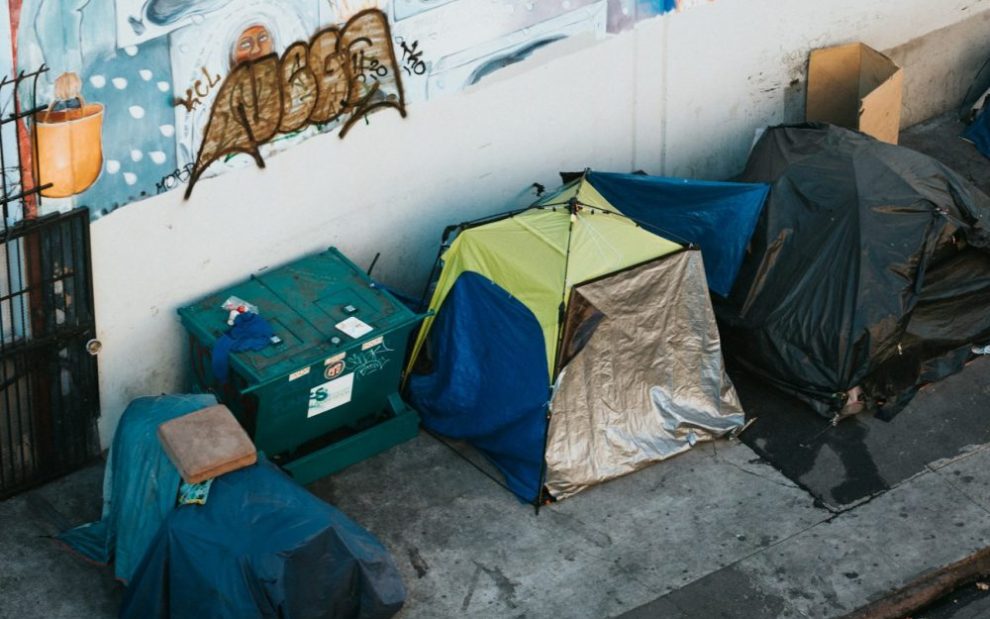As the U.S. bishops gather in Louisville this month, on their agenda will be a discussion of the future of the Catholic Campaign for Human Development (CCHD). That item is causing its supporters to worry if the nearly 55-year-old anti-poverty effort will succumb to ideological fissures and worries about money.
Since its beginning, CCHD has distributed grants to more than 200 community groups across the nation, with the goal of empowering and improving the lives of those experiencing economic hardship. Besides its national campaign funding, CCHD has also paid for scores of groups supported by local dioceses, which receive a quarter of its annual collection to fund projects.
The collection, taken up in most dioceses around Thanksgiving, is popular among American Catholics. It ranks second in revenues generated by national collections, only behind the appeal for retired Religious.
Advocates for CCHD, however, are concerned that track record will terminate as the U.S. bishops examine the future of the campaign during their annual summer meeting set for June 12–14, 2024. In response, a group of social justice advocates has drafted a letter petitioning the bishops to save the anti-poverty campaign.
CCHD is under fire because the U.S. church is strapped for cash. Covid-induced church attendance declines, a graying congregation across parishes, and the financial toll of the sex abuse crisis caused scores of dioceses to either declare bankruptcy or threaten such action. An April 26 article in the Pillar claims that anonymous sources at the U.S. Conference of Catholic Bishops (USCCB) say the CCHD collection has spent through its resources and needs to be revamped. According to the article, these sources say the fund has been mismanaged and is running a deficit in the millions of dollars.
Friends of CCHD argue that contributions rose to $8 million in 2022 from a low point of $4 million in 2020, after attendance at Catholic parishes rebounded post-Covid. CCHD advocates argue that by its nature, anti-poverty programs need to expend cash, and that the collection’s financial issues can be resolved without destroying its mission.
One group of advocates for CCHD recently drafted an open letter to the USCCB, asking that it continue to fund the program. The letter states: “We respectfully call on you, our shepherds, to guide us through these perilous times. The work of CCHD is more crucial than ever, ensuring that the Church remains a steadfast advocate for justice and compassion. Your continued support will help us address these challenges and uphold the values of our faith.” Multiple organizations and individuals have signed the letter, which was drafted by Christian Bentley, Cecilia Flores, Will Rutt, and Casey Stanton.
Advocates and opponents agree on one thing: CCHD’s funding—and very existence—is more than an internal ecclesial game of inside baseball, nor is its sole interest to the tiny coterie that follows the internal workings of the bishops’ conference. It is, they say instead, an indicator of where the church should be on the American scene. Should it be directing limited resources exclusively at internal charity efforts—or continuing to venture forth into the wider society to make a dent in the intractable issues of poverty?
One CCHD advocate is Rabbi Margie Klein, executive director of the Essex County Community Organization, an anti-poverty advocacy group north of Boston. Her group was instrumental, with the help of a CCHD grant, in lobbying for a raise in Massachusetts’ minimum wage, from $8 per hour in stages up to $15 per hour. Their successful campaign illustrates the credo of CCHD: organizing the poor and their advocates to improve their conditions through advocacy.
In Massachusetts, volunteers found that many people who waited on church pantry lines each month held jobs but earned wages too low to feed their families. Through CCHD, which provided grants to pay an organizer $50,000 per year over the course of much of a decade, a coalition was forged that successfully argued in the state legislature for a minimum wage raise. Workers who receive a living wage no longer need church food pantries.
And that’s a good thing, says Rabbi Klein. The minimum wage increase has lessened the demands on church pantries, while enhancing the dignity of low-paid workers. “They are able to make a better life for themselves,” she says. “The mission of the Catholic Campaign for Human Development is to do justice work, not just charity work. We want to solve problems before they hurt people.”
CCHD advocates also include John Carr, founder of the Institute on Catholic Social Thought and Public Life at Georgetown University and former bishops’ conference staffer. He says that chopping CCHD, during a time of great income disparity, would be a tragedy. CCHD, he says, “is the clearest example of Catholic social teaching in the United States. . . . The work is essential for the church in living out the Gospel.”
CCHD’s advocates point to its impact, which extends from Massachusetts to the work of Gabby Trejo, executive director of Area Congregations Together (ACT), in Sacramento, California. Trejo says CCHD assisted her group in organizing poor people to improve public schools and address the displacement of tenants facing rising rents in her community. In a region known for large numbers of immigrants and a spotty public transit system, the group worked for changes in California law that now allows undocumented immigrants to obtain driver’s licenses. The result, says Trejo, is that immigrants are better able to get to their jobs. Much of that advocacy emanated from needs articulated by parishioners at Our Lady of Guadalupe Church in Sacramento.
Trejo, herself a Catholic, says that charity is needed, but the church needs to help people organize to take charge of their own concerns. “Justice and charity are not opposed to each other. Charity builds on what is just,” she says.
Jeff Korgan has written extensively on the history of CCHD and sees the organization as part of a mainstream American church response to Catholic social teaching. He notes its origins as a response from U.S. bishops to the riots that ravaged American cities in 1968, pushing activists and social theorists to address urban poverty concerns. He cites its early support for Homeboy Industries, a widely praised job-training effort for former gang members begun by Jesuit Father Greg Boyle in Los Angeles. CCHD has also invested in scores of worker-owned cooperatives, through which workers participate in the capitalist system by earning a voice in their companies beyond their paychecks. CCHD, says Korgan, has also worked with the St. Vincent de Paul Society on programs to find work for former convicts. Café Reconcile, another CCHD-funded job-training program in New Orleans, has earned widespread praise.
Instead of overturning the economic system, CCHD works to share its fruits, says Korgan, who adds, “It has helped people to start businesses. The last I checked, that is called capitalism.”
At their Louisville meeting, the bishops are expected to address complaints from some Catholic groups who argue CCHD funds advocacy organizations that don’t align with church teaching. CCHD critics also argue that the church’s emphasis should be on charity, not on organizing people to take on politically controversial issues, such as minimum wage.
Groups like the Lepanto Institute and the American Life League argue that CCHD has funded groups that advocate for legal abortion, something CCHD says it has addressed by cutting off support for such organizations. Other critics argue that the model of CCHD goes beyond worthwhile charity into questionable advocacy work involving partisan politics.
CCHD critics say its focus is politically partisan. Business interests, for example, largely oppose minimum wage increases. CCHD-supported environmental work in Louisiana has run up against the fossil fuel corporations’ power.A small number of dioceses, including the Archdiocese of New York, have opted out of the collection entirely, replacing it with locally generated campaigns in support of Catholic Charities.
The long-term critics include Tom Pauken, now retired but previously active in Texas Republican politics. Pauken served in the Reagan Administration as the director of the volunteer agency ACTION. A Catholic, he frequently locked horns with his co-religionists and advocates for CCHD, going back to the 1980s. “CCHD was not directly helping the poor,” he says. “It was organizing the poor for policy change.”
He criticized the campaign’s origins, tying it to Chicago-area efforts at organizations that advocated for social change. Pauken notes that the controversial author Saul Alinsky’s Rules for Radicals, a handbook on how to generate public protest and activism, has become a guide for community-organizing groups around the country, many of which CCHD has funded.
Some people in Republican Catholic circles have long argued that supporting community organizing takes away from needed direct charity work. They say that CCHD’s theory of supporting activist groups smacks of Marxism—or at least leans leftward.
Richard Wood, professor of sociology at the University of New Mexico and president of the Institute for Advanced Catholic Studies at the University of Southern California, is a former advisor to CCHD. He says the current flap has more to do with contemporary polarized politics and social media campaigns than a serious critique of Catholic social teaching. Wood argues that the effort against CCHD is spurred by partisan advocates who represent only a few Catholics. The program has long earned the bishops’ support, he says, who see the impact it makes on their dioceses.
Wood calls for the bishops to stand up to their critics. “Do the bishops want to be intimidated from doing their mission by a small group of online activists? That’s what’s on the table.”
The sensitivities are apparent as the stakes are high. Few people in the know are providing much information for the record. Bishops’ spokesperson Chieko Noguchi said only that the future of CCHD will be discerned during the upcoming bishops’ meeting in Louisville. There, the bishops “will be spending time prayerfully discussing the best way they can continue to help the poor and disenfranchised emerge from the cycle of poverty considering post-pandemic needs and resources,” she wrote in an email.
Rabbi Klein, speaking for her community organization north of Boston, sees CCHD as making a desperately needed impact. She hopes her interfaith allies in the Catholic community can continue to finance CCHD because its work transcends the Catholic community. “It’s a hidden gem of the Catholic Church. It is something for Catholics to be really proud of,” says the rabbi.
Image: Unsplash/Nathan Dumlao














Add comment